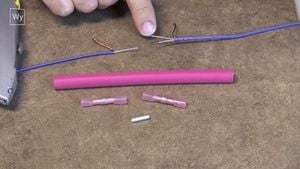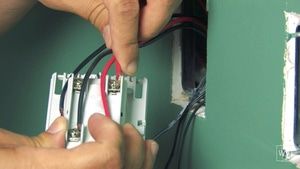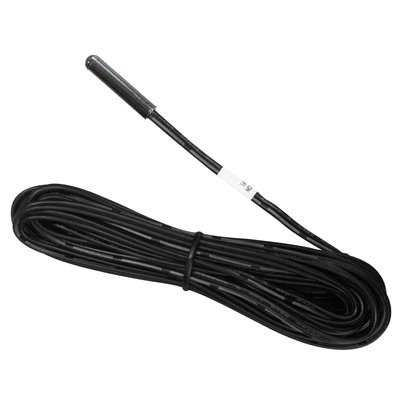
TempZone™ Easy Mat 120V 3′ x 5′, 15 sq.ft., 1.9A
This support page provides publications, manuals, specifications, videos, support articles, and common support questions
Common Support Questions
Yes. Unlike the heating cable for electric floor heating, the cold lead wires can be trimmed.
Need more help? View support options
To prevent any melting, ensure that the heating wire is at least 4” from the toilet wax ring.
Need more help? View support options
Yes, but any furniture that may trap heat, such as pieces with an enclosed bottom, should be avoided. Furniture on legs with a clearance of at least 3" is permissible.
Need more help? View support options
When installing electric floor heating over a concrete slab, an insulating underlayment like ThermalSheet is highly recommended to ensure efficient operation, faster heating times and warmer floor temperatures.
Need more help? View support options
When WarmlyYours electric floor heating systems are being installed on a concrete slab, we strongly recommend adding a layer of insulation over the slab prior to installing the system. While our electric floor heating provides up to 25% more heating power per square foot than many of our competitors, the slab will always act as a "heat sink." Some of the heat that would otherwise be transferred to the flooring surface will remain in the slab, causing the floor’s surface temperature to be considerably lower. This is true with any electric radiant floor heating system.
When installed on top of a concrete slab without insulation, it is generally accepted that electric floor heating will take the chill away from the floor and provide a small amount of warmth. Adding insulation on top of the slab and beneath any electric radiant floor heating system will allow a greater percentage of the heat generated to transfer to the flooring surface. This results in greater efficiency and therefore faster warm up times, higher expected surface temperatures and lower energy usage. The floor will have the capacity to warm to a comfortable temperature, and in some cases can be employed as the primary heat source for that room.
The recommended types of insulation are natural cork, insulated tile backer boards and insulated underlayment, such as ThermalSheet™ synthetic cork.
Need more help? View support options
Electric-resistance heating cables and systems have no polarity. This includes all current WarmlyYours heating elements.
Need more help? View support options
The subfloor will need to be prepared as per the instructions of the self-leveling cement (SLC) used. Please note that most self-leveling products require the use of a primer as specified by the SLC company.
Need more help? View support options
The breaker and wire sizes are selected based on the total amperage of the WarmlyYours heating system connected to a single thermostat. This information is on the WarmlyYours heating system's installation plan, electrical plan, or UL label. Based on guidelines from the National Electrical Code: loads up to 16 Amps may utilize 12 gauge wire with a 20-Amp breaker, and loads up to 12 Amps - 14 gauge wire with a 15-Amp breaker. Local code and/or other factors may change these guidelines.
Need more help? View support options
Yes, using a square-notch trowel (1/4” x 1/4” or larger), apply a layer of thinset to the subfloor area which will later be covered by the WarmlyYours TempZone™ Flex Roll, Easy Mat or Custom Mat.
Need more help? View support options
WarmlyYours’ 25-Year No Nonsense™ Warranty is the most comprehensive warranty in the industry. In the event of a defect, we cover not only the repair or replacement of the TempZone™ system, but ALSO any labor costs AND flooring materials required to perform the repair. We do not cover the cost of flooring that needs to be replaced in the event of a repair necessitated due to damage. If a product is damaged by a power surge, that would not be covered by our warranty
Need more help? View support options
One thermostat can control multiple heating mats/cables as long as all the heating elements are using less than 15 amps:
TempZone™ will cover aprx. 120 sq. ft. for 120V systems and 240 sq. ft. for 240V systems on one thermostat.
Environ™ will cover aprx. 150 sq. ft. for 120V systems and 300 sq. ft. for 240V systems on one thermostat.
Slab Heat will cover aprx. 90 sq. ft. for 120V systems and 180 sq. ft. for 240V systems on one thermostat.
Need more help? View support options
No. Never cut the heating cable. The floor heating cable is designed with a very specific resistance in order to consistently maintain heating at the chosen wattage per square foot. Trimming the heating cable would lower the resistance of the cable causing the system to overheat. Adding heating cable to the system would raise the resistance and the system would not heat properly.
Need more help? View support options
No. A bathroom floor would be installed in the same way. Our TempZone floor heating systems are wet-location listed and ideal for bathroom floors.
Need more help? View support options
Yes, Luxury Vinyl Tile (LVT) is typically installed over the embedded heating element using self-leveling cement (SLC). Many people choose to use SLC when installing tile over floor heating.
We do not suggest using thinset to encase the heating wires with LVT, as it is very difficult to get thinset completely flat.
Need more help? View support options
Our TempZone electric floor heating products are waterproof and wet location listed.
Need more help? View support options
Make sure any cracks or raised edges are sanded down before installation. Seal and patch cracks where possible. If needed, pour a layer of self-leveling cement to make sure surface is level and flat. Then proceed with instructions to install desired floor heating system and flooring.
It is strongly recommended that an insulating underlayment be installed between the slab and heating element to prevent heat loss.
Need more help? View support options
We suggest the heating product be embedded in a minimum of 3/8" of self-leveling cement (SLC). Always check with the manufacturer for specific recommendations.
Need more help? View support options
Yes. In addition to TempZone™ and Slab Heat, we also have specially sized Shower and Bench mats designed specifically for shower installation. They are all wet location listed for radiant floor heating in a shower.
Need more help? View support options
Waterproofing for the room is in the layer above the floor heating system. The layers for waterproofing this type of floor are:
- subfloor
- thinset
- uncoupling membrane
- tempzone heating cable
- waterproofing tape for seams and corners
- thinset or self leveling cement
- tile floor
Need more help? View support options
WarmlyYours has recently begun including floor sensors with our heating elements to help ensure customers will have everything they need for optimal operation of their radiant heating systems.
The sensor included with your floor heating element can be installed with the heating system (the sensor is equally spaced between runs of the heating wire--see your install manual for more info). Installing this sensor with your floor heating control will enable energy efficient operation of the floor warming system based on the floor temperature instead of the ambient room temperature.
We generally recommend that you install a second, unconnected backup floor sensor alongside the primary one. In the very unlikely event that your first floor sensor is damaged, this install method will save you from having to pry up flooring to replace a floor sensor. You simply disconnect the damaged sensor from the thermostat and connect the backup sensor.
In addition to the floor sensor that was included with your heating element, our nSpiration Series thermostats also come with a floor sensor. If you purchase both a heating element and an nSpiration Series thermostat from WarmlyYours, you'll have a primary and a backup floor sensor for your system.
Need more help? View support options
The TempZone™ Flex Rolls, Easy Mats and Shower Mats are designed to deliver 15 watts per square foot (maximum allowed by the National Electrical Code), with the heating element positioned 3” apart on a serpentine loop attached to a fiber mesh. The TempZone™ Cable yields between 8-12 watts per square foot, variable, based on the cable spacing. TempZone™ Custom Mats are made to order, so the spacing of the heating element throughout the mat varies according to each specific design. The TempZone™ Custom Mats can yield from 12 to 15 watts per square foot.
Need more help? View support options
Yes, if the flooring manufacturer recommends this installation method. In most cases, the heating element will still need to be embedded in self-leveling cement before the flooring is installed.
Need more help? View support options
There are heating systems designed for floating floors, such as our Environ system. However, the flooring must be rigid enough so it does not mold itself to the heating cables over time.
Check the flooring manufacturer's floor heating recommendations. In most cases, the heating system will need to be embedded beneath the flooring. Check for all "flatness" requirements for the flooring you choose. The flattest floors utilize self-leveling cement when installed correctly.
Need more help? View support options
The TempZone™ twin conductor cable present in our TempZone™ products is comprised of a double-insulated, coaxial heating cable. The total thickness of the system can be between ⅛” and 5/32” thick and will not noticeably affect the height of your installed flooring.
Need more help? View support options
82°F - 85°F is the most common comfortable warm temperature of the floor.
Need more help? View support options
Yes, we offer several options to help make your floor heating system water resistant or waterproof. Our TempZone product line is designed for wet areas - making it completely safe for rooms that will have water on the floor at times or may experience leaks or flooding. We also offer waterproofing bands for our TempZone Cable + Prodeso Uncoupling Membrane system. Allowing you to waterproof all seams and the perimeters of the wall - guaranteeing that your floor heating system stays safe and prevents water from leaking to areas below.
Need more help? View support options
A digital meter with a 0-200 Ohms scale ( Ω ) to measure the heating wire's resistance, and a 20K scale to measure the sensor's resistance.
Need more help? View support options
For Tempzone it is 51 BTU’s per square foot per hour and for Environ, it is 41. Take the wattage of the product (shown on the product’s label) and multiply that by 3.41. That is the BTU value for that product.
Need more help? View support options
Single Conductor vs. Twin Conductor Identification
- A single conductor floor heating system is a loop of one core wire, it starts at the thermostat and ends at the thermostat - this is the original method of manufacturing heating cable. Most single conductor floor heating systems have the same color cold lead wire connected to both load terminals/pigtails of the thermostat. Some early single conductor floor heating systems were produced with a white and a yellow cold lead wire.
- A twin conductor floor heating system terminates two core wires at the end, both wires start at the thermostat - this is the current method of manufacturing heating cable. Most twin conductor floor heating systems will have two different colored cold lead wires, and one of these is black. The other wire in a WarmlyYours floor heating system is either yellow (120V system) or red (240V system). A few early Environ systems had two black cold lead wires.
Note:
- Not all heating cables are wired directly to the thermostat. It may have been necessary during installation to terminate the heating cable in a junction box, and then run a separate (contractor-supplied) wire from the junction box to the thermostat.
- WarmlyYours single conductor cold leads were produced with a 13‘ length at the start of the loop, and a 26‘ length at the end. The 120V floor heating systems had a yellow and a white label attached to the cold leads, and the 240V floor heating systems had a red and a white label attached.
- If you have a single conductor floor heating system and notice that one cold lead is thicker or feels hotter than the other, please contact technical support at +1 (800) 875-5285
Need more help? View support options
Test the TempZone floor heating cable using a digital ohm meter as shown here.
Need more help? View support options
Both are 15 feet long.
Need more help? View support options
Resistance below this value may result in no heating or cold spots in the floor. This may be caused by exposure to moisture or other conductive material that penetrates the core insulation.
Need more help? View support options
Resistance greater than this value may result in overheating or even total failure of the floor heating system. This may be caused by a crimping or other damage to the wire.
Need more help? View support options
The amount of amperage draw depends upon how large the area is that you are heating. For coverage of areas less than 30 square feet, a 120V TempZone system will draw less than 4 amps. If you have a larger area over 240 square feet of heated space, then you will need a larger breaker plus additional controls. No matter what the size of the area you choose to heat, we recommend a dedicated circuit for your electric radiant floor heating system.
Need more help? View support options
For systems below 12 Amps, a 15 Amp, Non-GFI breaker is fine. For systems 12 to 16 Amps, a 20 Amp, non-GFI breaker is needed. Breaker sizes are noted on the installation plan that ships with many orders.
Need more help? View support options
The ground wire in the floor mat must be connected directly to the ground wire of the supply or to the house ground wire.
Need more help? View support options
Temperature affects core resistance - lower temperatures decrease resistance and higher temperatures increase resistance. Another consideration is the test equipment, sometimes switching test units, adjusting the calibration, or allowing for the verified differential may be necessary.
Need more help? View support options
Publications and Manuals
Project Planners
Floor Heating Request for Quotation Form (English)Calculating Project Dimensions (English)
TempZone Easy Mat Materials And Tools Checklist (English)
Technical Specifications
TempZone™ Floor Cross Section using Glued-Down Engineered Wood Over Concrete (English)TempZone™ Floor Cross Section using Glued-Down Engineered Wood over Insulated Concrete (English)
TempZone™ Floor Cross Section using Resilient Flooring over Insulated Concrete (English)
Technical Support
Floor Fault Location Thermal Camera Troubleshooting Kit Instruction (English)TempZone™ Twin Conductor Ohm Reading Guide (English)
Floor Fault Location Thermal Camera Troubleshooting Kit Instruction (Spanish)
Floor Fault Location Thermal Camera Troubleshooting Kit Instruction (French)
TempZone™ Cut & Turn Twin Conductor Repair Kit Instructions (English)
TempZone™ Cut & Turn Twin Conductor Solder Method Wire Repair (English)
TempZone™ Mega Ohm Reading Instructions (English)
TempZone™ Twin Conductor Ohm Reading Guide (French)
TempZone™ Twin Conductor Ohm Reading Guide (Spanish)
TempZone™ Twin Repair Endcap (English)
Sell Sheets
TempZone Easy Mat Sell Sheet USA (English)TempZone Floor Heating Comparison Chart USA (English)
Specifications
Electrical
| Amps | 1.89 A |
| Cold Lead Wire Gauge | 17 AWG |
| Floor Load | 0.23 kW |
| Ohms | 63.66 Ω |
| Ohms Per Ft | 1.117 Ohm/ft |
| Thermal Power | 0.23 kW |
| Voltage | 120 V |
| Watts | 226 W |
| Watts Per Sq. Ft. | 15 Watts Per Sq. Ft. |
Warranty / Certifications
| Approvals | cULus listed |
| Warranty | 25 Year Warranty |
| Wet Location Listed | US, Canada |
Performance
| BTU Per Hour | 771 Btu |
Product Dimensions
| Cold Lead Length | 15′ |
| Coverage | 15 ft² |
| Heating Cable Length | 57′ |
| Heating Element Thickness | 1/8″ |
| Length | 5′ |
| Size | 3′ x 05′ |
| Weight | 2.2 lbs |
| Width | 3′ |
Appearance
| Color | Green |
Logistics
| Country of Origin (COO) | India |
Installation
| Floor Types | Commonly installed beneath tile and stone |
Identifiers
| SKU | TRT120-3.0x05 |
| UPC (GTIN-12) | 881308022082 |
Videos
Product Line Videos
Articles
Links to video instructions for installing TZ Twin
NobleSeal with EFH
Self Leveling Underlayments Compatible with EFH
Troubleshooting the circuit check
Similar Items
Do you need support or specifications for a specific model? Identify your model below.












